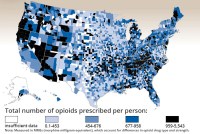Latest Morning Briefing Stories
To Grow Market Share, A Drugmaker Pitches Its Product To Judges
Some drug courts offer participants a full range of evidence-based treatment, including medication-assisted treatment. Others don’t allow addiction medications at all. And some permit just one: Vivitrol.
Denial, Appeal, Approval … An Adult’s Thorny Path To Spinraza Coverage
The FDA granted approval for Spinraza in late December for use on children and adults with spinal muscular atrophy. Insurance coverage is mostly focused on infants and children.
Drug Puts A $750,000 ‘Price Tag On Life’
The high cost of Spinraza, a new and promising treatment for spinal muscular atrophy, highlights how the cost-benefit analysis insurers use to make drug coverage decisions plays out in human terms.
Follow The Money: Drugmakers Deploy Political Cash As Prices And Anger Mount
Embattled opioid seller Mallinckrodt is one of many pharmaceutical companies boosting political contributions and lobbying on Capitol Hill.
Congress Squares Off Over Drug Pricing And A Controversial Drug Discount Program
The controversial 340B drug discount program for hospitals came under fire at a congressional hearing.
Amount Of Opioids Prescribed In U.S. Has Been Falling Since 2010
Report by CDC researchers finds a steady fall in opioid use in recent years, but the rates are still three times higher than in 1999.
Alerta por nueva droga: es para neuropatías, pero la usan adictos a opioides
La gabapentina se utiliza para tratar afecciones de los nervios, pero la están usando cada vez más adictos a opioides. Es la quinta droga más recetada del país.
New On The Streets: Drug For Nerve Pain Boosts High For Opioid Abusers
Gabapentin, prescribed for epilepsy and nerve damage, is touted by federal health officials as an alternative to opioids for patients. But some are now abusing the drug.
Seniors Miss Out On Clinical Trials
Among hurdles: Older adults may have multiple illnesses that could complicate research or they might be unable to manage the commute.
Take Our Quiz To Test Your Wits On Aging
As we get older, it helps to tickle the noggin with trivia. Here’s a pop quiz to see what you have learned as a regular reader of Kaiser Health News.
Patients With Mental Disorders Get Half Of All Opioid Prescriptions
A study finds that nearly 19 percent of people with mental illnesses use prescription drugs, while only 5 percent of other people do.
Exclusive: White House Task Force Echoes Pharma Proposals
Documents examined by Kaiser Health News shed light on the workings of the Trump administration’s “Drug Pricing and Innovation Working Group.”
Tweet Revenge: Twitter Erupts As Diabetes Forum Tries To Lock Down Photo Sharing
This year’s American Diabetes Association scientific meeting came with a hefty price — a policy of no photography and limits on social media. That did not go over well on Twitter.
“¿Cuánto tiempo me queda, doctor?” Por qué muchos pacientes con cáncer no obtienen respuestas
Muchas veces los pacientes con cáncer no reciben respuestas adecuadas a preguntas críticas, entre ellas, la más crucial y universal de todas.
‘How Long Have I Got, Doc?’ Why Many Cancer Patients Don’t Have Answers
Due to poor doctor-patient communication, most people with advanced cancer don’t know enough about their disease to make vital decisions.
Former Pharma Reps’ New Mission: To School Docs On High Drug Costs
One insurer is turning the tables on drugmakers with what may be a new job category: a sales force for cost-effective medicine.
Daylight On Diabetes Drugs: Nevada Bill Would Track Insulin Makers’ Profits
With the cost of medications up 300 percent in the past decade, supporters see this as a first step to rein in prices.
Many COPD Patients Struggle To Pay For Each Medicinal Breath
One in 9 Medicare enrollees have COPD and many of them can’t afford the inhalers that keep them out of the emergency room.
Drug Rebates Reward Industry Players — And Often Hurt Patients
A new JAMA study examines how drug rebates can direct money to middlemen and force Medicare patients to cough up more money.
New York State Wants Its Prescription Drug Money Back — Or Else
A new law gives Medicaid regulators power to threaten drugmakers with cost-effectiveness scrutiny unless they grant additional rebates.
























